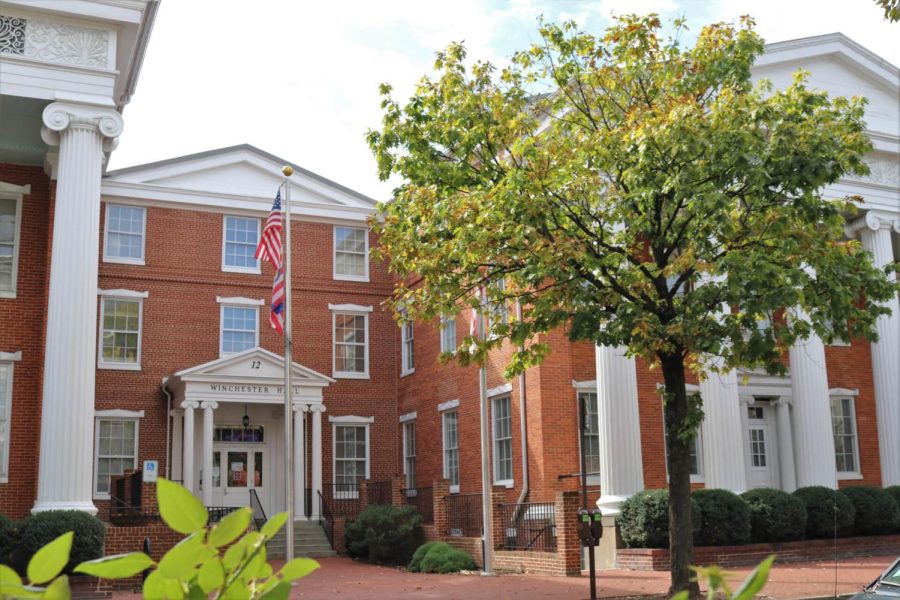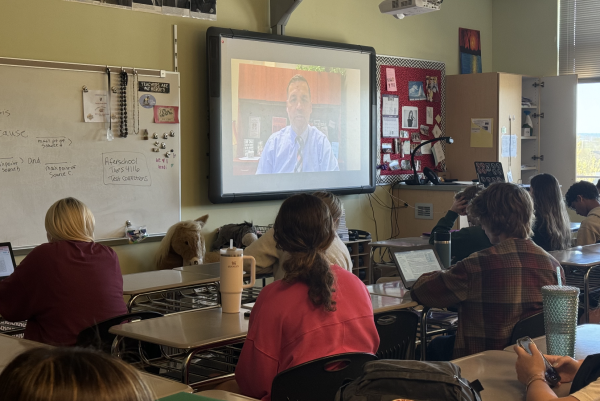Dire budget situation forces FCPS to cut valuable programs
The Frederick County Council held a budget meeting on May 30 at Winchester Hall in downtown Frederick.
June 1, 2023
As the 2022-2023 school year draws to a close, students and teachers alike look forward to relaxing summer breaks and having fun with family and friends.
But for some, what should be a relaxing period of rest will be marred by concerns about the upcoming school year, brought upon by budget issues in the Frederick County Public School (FCPS) system.
In January, FCPS superintendent Cheryl Dyson proposed a budget for the 2024 Fiscal Year (FY) that was seventy five million dollars above the legally required maintenance of effort (MOE). Maintenance of effort is a Maryland state law that protects the quality of children’s education by discouraging local governments from shortchanging school systems.
Fifty million of the request was designated to help the county respond to rising enrollment rates and inflationary costs. Other budget considerations comprising this request were funds for the FCPS salary pool to help meet the state Blueprint for Education mandate that includes a $60,000 starting teacher salary by 2026. Presently, FCPS starting salaries are more than $8,000 below this required minimum.
In April, Frederick County Executive Jessica Fitzwater proposed an education budget allocation that was roughly forty million less than Dyson’s proposal.
New housing developments and construction of new elementary and middle schools across the county have caused recent enrollment numbers to skyrocket. The FCPS student population has grown by more than 3,600 students from Fiscal Year 2021 to Fiscal Year 2023. Linganore High School’s student population in particular will have increased by over 200 students since Fiscal Year 2021, based on the projections for Fiscal Year 2024.
This growth makes FCPS the fastest growing district in Maryland, approximately 10%, while the second-highest growth rate was 2.4% and 18 other school systems in the state saw a decrease. However, the system used by the state to allocate education funding does not account for a significant portion of the enrollment increase.
Dubbed the “September 30 count,” education funding in Maryland is based on the number of students enrolled in a district on September 30 of the prior school year. This figure does not take into account the hundreds of students that have joined Frederick County since September 30 nor the even greater numbers that could enroll before the next school year begins.
The less than ideal budget proposed by Fitzwater means that the Board of Education will be forced to make some difficult decisions in order to trim roughly forty million dollars, the largest deficit FCPS has faced in years, from its draft.
“The reality of a reduced budget equates to tough decisions for the board that ultimately impact students via the reduction of services we are able to provide” — Jason Johnson
Some programs on the chopping block include the Blended Virtual Learning Program for first and second graders and the Elevate Summer Academy.
Board of Education (BOE) member Jason Johnson spoke on the impact of these cuts on students across the county.
“The reality of a reduced budget equates to tough decisions for the board that ultimately impact students via the reduction of services we are able to provide,” Johnson said. “A direct example can be seen in an action taken recently by the board whereby we reluctantly ceased the provision of our summer Elevate program which was touted as a success in helping students emotionally and academically recover from the effects of the pandemic.”
The FCPS Elevate program is a five-week summer academy, designed for students K-12 who faced setbacks in their education due to the COVID-19 pandemic. The programs have a small, 15:1 student faculty ratio, and provide breakfast, lunch, and transportation for students.
Science teacher Jessica Walker, who runs the Elevate program at Linganore High School, says that the BOE’s recent decision to cut the program could be detrimental to the progress of many students within the Linganore community.
“I think that cutting the program puts students who need the extra help at a disadvantage.” Walker said. “While there is the option of Virtual Summer School, I don’t think that online schooling works for everyone. Some students need to sit in front of a teacher and ask questions. They need to use manipulatives to learn and may not have access to those at home.”
While still a dire situation, FCPS could see some further funding assistance from the county council.
On May 10, Executive Fitzwater proposed an additional $14 million supplement to help counteract the budget shortcomings. This supplement would bring the total education budget allocation to four hundred and nineteen million dollars.
Fitzwater remarked on her proposal in a recent statement.
“With this supplemental budget, I am proposing to hold FCPS harmless from a state decision and to mitigate the effects of a massive premium increase on your employees and retirees,” Fitzwater said. “Together, these actions will help FCPS deal with the unprecedented challenges currently facing our school system.”
The Frederick County Council voted on Tuesday, May 30 to approve the supplemental budget proposed by Fitzwater but failed to pass additional funds in a separate motion.
If anyone would like to learn more about this issue or voice an opinion or concern, the BOE will hold a special meeting regarding the budget on June 7. The meeting will be open to the public at 7 p.m. and will be held in the FCPS Administration Building located at 191 East Street in Frederick, Md.
All BOE meetings are live-streamed and will be shared within three business days. You can access those live streams and recordings here.














